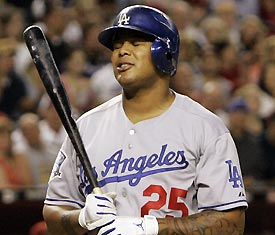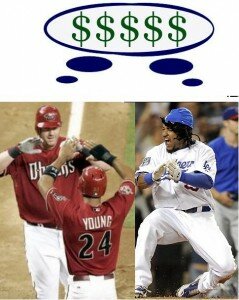
I wanted to call this post “Andruw Jones is a Jackass,” but I’ve calmed down – a little. Nothing really upsets me more than professional athletes being completely out of touch with the real world and their own self worth. After reading the article on Jones by Dylan Hernandez in today’s Los Angeles Times, I was seeing red. And not Texas Ranger red. Sure, I knew this day was coming after seeing the Dodgers’ trip to Arlington on the calendar at the beginning of the year, but Andruw Jones’ jackass remarks still tweak me. From Dylan Hernandez:
He (Jones) batted.158 with three home runs and 14 runs batted in and was granted his release over the winter by agreeing to defer a significant portion of the $22 million remaining on his deal.
“As things were going along, I didn’t think I was in their plans,” Jones said. “I had to make a decision and move on.
Andruw, do you REALLY think the Dodgers would sign you to a two-year, $36+ million contract if you weren’t “in their plans’? We needed a power hitter, and you were going to be that guy. The Dodgers had four outfielders to inspire a sense of competition, but something tells me that competition was supposed to be geared towards Kemp and Ethier to keep “the kids” (as they were considered at the time) motivated. Unfortunately it was also needed to keep your overweight and unmotivated body moving as well.
While acknowledging that McCourt paid him a hefty salary, Jones said the owner had no right to complain about a deal that was mutually agreed upon.
“I got paid that money because that was my value,” Jones said, pointing to the numbers he posted in 12 seasons with the Atlanta Braves.
So what you’re saying, Andruw, is that you DESERVED that money based on past performance, and didn’t need to earn that money while you were here. The phrase that kills me is “no right to complain.” You’re damn right McCourt had a right to complain and he did the right thing for Dodger fans everywhere when he deferred the remaining $22 million and cut you loose. In retrospect, that contract was one of the worst in Dodger history – if not baseball history – and you should be ashamed of yourself. In addition, in the Texas media, it’s been noted that Jones holds “no animosity” towards the team that paid him to disappear. How noble of Mr. Jones.
The bottom line is that Andruw Jones just doesn’t get it. He has a sense of entitlement that I feel is just sickening. I knew it wasn’t going to happen, but I had hoped that he would be contrite, apologetic and honest when he met with the media while the Dodgers were in town. Instead, we saw the defiant and remorseless Andruw Jones that was here in LA. I didn’t see any TV interviews with him, but I bet he flashed that little half-smile he loved to show after striking out while in LA. Andruw Jones just doesn’t get it – and probably never will.
UPDATE: I’m listening to the Dodgertalk guys during the electrical delay during tonight’s game and they echoed the comments above. Plus, they said Jones’ 2008 season was the WORST statistical season of all time for batters with 200+ at bats.
Photo Credit: Los Angeles Dodgers


